Rabicip 20 mg (Rabeprazole)
Rabicip 20 Tablet is a medicine that reduces the amount of acid produced in your stomach. It is used in the treatment of acid-related diseases of the stomach and intestine such as acid reflux, peptic ulcer disease, and Zollinger-Ellison syndrome. It provides relief from symptoms and promotes healing.
Rabicip 20 Tablet belongs to a group of medicines called proton pump inhibitors, which are used to reduce the amount of acid produced in the stomach. It is commonly prescribed to treat duodenal ulcers (sores in the upper part of the small intestine), gastro-oesophageal reflux disease or GERD (when stomach acid flows back into the food pipe), heartburn (a burning feeling in the chest caused by acid), and erosive oesophagitis (damage to the lining of the food pipe due to acid). It is also used to treat infections caused by a stomach bacteria called Helicobacter pylori (along with antibiotics), and a rare condition called Zollinger-Ellison syndrome (when the stomach makes too much acid).
Rabicip 20 Tablet contains Rabeprazole, which works by blocking the acid-producing pumps in the stomach. By reducing acid levels, it helps relieve symptoms, allows ulcers and damaged areas to heal, and prevents new ulcers from forming.
Your doctor will decide the correct dose and duration depending on your condition, so it’s essential to follow their instructions carefully. Some people may experience side effects while taking Rabicip 20 Tablet . Common ones include headache, dizziness, diarrhoea, constipation, nausea, vomiting, gas (bloating), weakness, or a runny nose. These are usually mild and go away on their own. However, if any of these symptoms continue or become bothersome, you should contact your doctor.
Before taking Rabicip 20 Tablet , inform your doctor if you have any liver problems or a stomach tumour. Long-term use may lower magnesium and vitamin B12 levels, and slightly increase the risk of bone fractures. Avoid alcohol, as it can increase stomach acid and side effects like drowsiness. Additionally, this medication may cause drowsiness or dizziness, so avoid driving or operating machinery until you feel fully alert. Rabicip 20 Tablet is not recommended for children, and if you are pregnant or breastfeeding, consult your doctor before using it.
Side Effects of Rabicip 20 Tablet
- Headache
- Dizziness
- Diarrhoea
- Constipation
- Nausea
- Vomiting
- Flatulence (wind)
- Weakness
Uses of Rabicip 20 Tablet
Rabicip 20 Tablet is used to treat the following conditions:
- Gastro-oesophageal Reflux Disease (GERD): Relieves heartburn and acid reflux by reducing stomach acid.
- Erosive Oesophagitis: Heals damage to the food pipe caused by excess stomach acid.
- Duodenal Ulcers: Helps heal sores in the upper part of the small intestine.
- Gastric Ulcers: Treats and heals ulcers in the stomach lining.
- Helicobacter pylori Infection (with antibiotics): Helps eliminate bacteria that cause ulcers.
- Zollinger-Ellison Syndrome: Controls excessive acid production in the stomach.
Directions for Use
- Rabicip 20 Tablet can be taken with or without food depending on the medical condition. However, it is preferable to take it at least 30 minutes before a meal for better efficacy.
- It is usually taken 1-2 times daily or as prescribed by your doctor.
- Swallow Rabicip 20 Tablet as a whole with a glass of water.
- Do not crush or chew this medication.
Medicinal Benefits
- Rabicip 20 Tablet contains Rabeprazole, a proton pump inhibitor (PPI) used to treat conditions caused by excess stomach acid.
- It is commonly prescribed to manage acid-related disorders such as gastric and duodenal ulcers, acid reflux, and GERD (gastro-oesophageal reflux disease).
- Rabeprazole works by blocking proton pumps in the stomach lining, which are responsible for producing acid.
- By reducing acid levels, Rabicip 20 Tablet helps relieve symptoms like heartburn, indigestion, and sour burps.
- It also promotes the healing of ulcers and acid-related damage in the oesophagus (food pipe).
- When taken as prescribed, Rabicip 20 Tablet helps prevent the recurrence of ulcers and effectively manages chronic conditions such as GERD and Zollinger-Ellison syndrome.
- Maintaining a healthy diet, avoiding spicy or acidic foods, reducing stress, quitting smoking, and limiting alcohol can improve the effectiveness of Rabicip 20 Tablet and support better digestive health over time.
How Rabicip 20 Tablet Works
Storage
What if I have taken an overdose of Rabicip 20 Tablet
Drug Warnings
- Do not take Rabicip 20 Tablet if you are allergic to Rabeprazole or any of its ingredients.
- Inform your doctor if you have liver problems, gastrointestinal conditions, or are scheduled for specific lab tests (e.g., Chromogranin A), as Rabeprazole may affect results.
- Consult your doctor if you are pregnant, planning to become pregnant, or breastfeeding, before starting Rabicip 20 Tablet .
- Seek medical attention if you experience symptoms such as severe abdominal pain, persistent diarrhoea, dizziness, muscle cramps, or signs of low magnesium or vitamin B12 deficiency.
- Let your doctor know about all other medications you are taking, including over-the-counter drugs, herbal products, or supplements, to avoid interactions.
- Use in children is not recommended, as the safety and effectiveness of Rabicip 20 Tablet have not been established in pediatric patients.
- Elderly patients (65 years and above) should use Rabicip 20 Tablet with caution, as they may be at greater risk for side effects like low magnesium levels, vitamin B12 deficiency, and bone fractures with long-term use.
| Quantity |
|---|

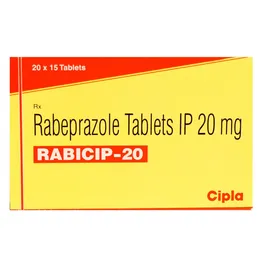
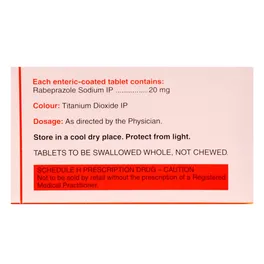
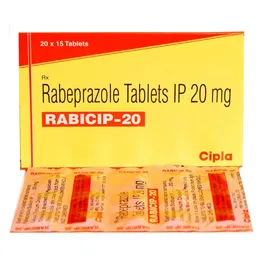

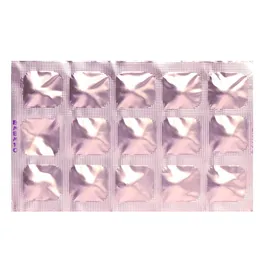
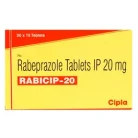
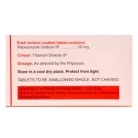
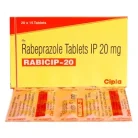
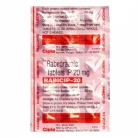

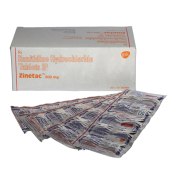
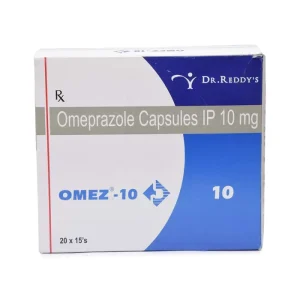
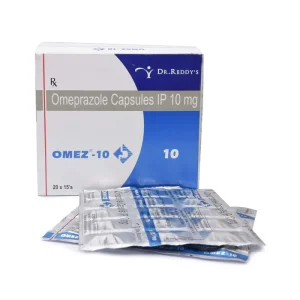


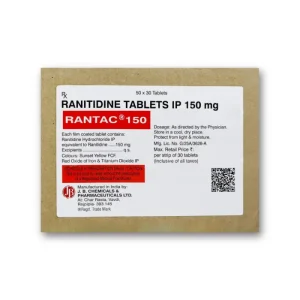
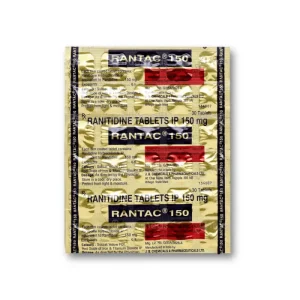
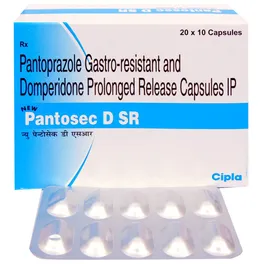

Reviews
There are no reviews yet.